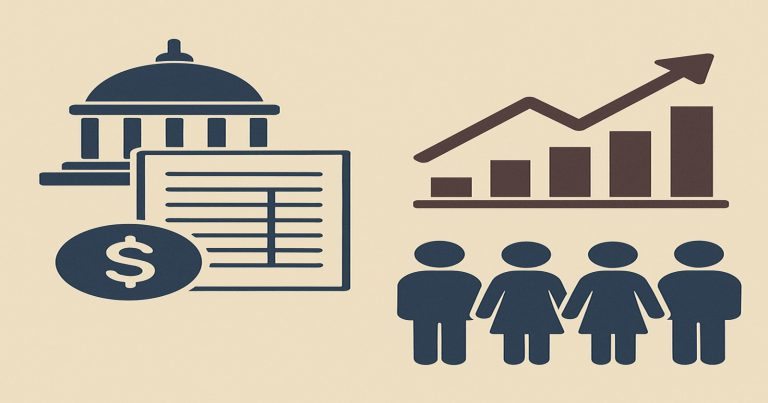A government budget is the economic blueprint of the nation. It estimates revenues and expenditures for a financial year, and it is one of the most potent weapons of fiscal policy. The Government uses budgets not only to allocate funds to public goods and services but also to manage inflation, create jobs, and generally stimulate economic growth. The relationship between the government budget and the economy is direct and dynamic; what the government earns and spends affects everything from performance to consumption patterns in the private sector. This article tries to delve into the structuring of budgets, the economic implications that come with them, and their sectoral impact.
What is a Government Budget?
A government budget is more than just a financial plan for the year; it is a policy document at the core of government priorities, commitments, and economic strategy. Annually drawn, it specifies expected revenue collection (through taxes, fees, dividends, etc.) and planned expenditures for development, defence, subsidies, social programs, etc. It is crucial to understand its types and components to comprehend its economic significance.
Types of Government Budgets
Balanced budgets (the revenues match the expenditure), deficit budgets (spending exceeds income), and surplus budgets (income exceeds expenses) are the three forms of budgets. Each one has specific economic implications that are predetermined depending on current economic conditions in the country.
Revenue and Its Relevance in Budget
Revenue is both direct and indirect tax collection, along with dividends drawn through other public sector enterprises and fees. These funds thus constitute the backbone of government service provisions, and effective collection is essential for a healthy economy.
Expense Heads in a Budget
Expenditure can be divided into capital expenditure and revenue expenditure, where capital expenditure stands for investments in infrastructure for the long term. In contrast, revenue expenditure includes salaries, pensions, and interest payments. Intelligent allocation of these expenses can fuel development while sustaining fiscal prudence.
Fiscal Deficit and the Budgetary Balance
A fiscal deficit occurs when total government expenditure exceeds total revenue, excluding borrowing. Ongoing deficits are dangerous, as they can cause inflation and the accumulation of debt. It is against this background that we view the fiscal road map towards achieving national objectives, full employment, equitable income distribution, balanced regional development, and economic stability.

The Economic Impact of the Government Budget
The economy is shaped by the spending decisions made through taxation and borrowing from the government budget. All of them affect macroeconomic indicators such as GDP, inflation, unemployment, and national public debt. An investment-stability-led budget would simultaneously generate short-term demand and keep offering gains of productivity in the long run.
Boost Economic Growth through Investment
Infrastructure investment by the government, education, and technology will spur economic activity, create jobs, and thereby draw the attention of private investors. The government budget-driven public expenditure acts as a catalyst for development.
Budget and Mechanisms for Inflation Control
Any government can adjust inflation levels through changes in expenditure levels or tax policy settings. Cuts in spending and the raising of taxes restrict demand, and hence inflation is controlled.
Generating Employment
Public investment, infrastructure, education, and health have a dual-output benefit in terms of job creation. Not only will employment be generated directly in qualified capacities within the government, but also the private sector through ‘spillovers.’
Budget Pronouncements
A budget that the government shapes to become business-friendly through tax incentives and investment in critical infrastructure boosts the confidence of the private sector to take action with capital infusion and increases industrial growth.
Managing Deficits
With careful design and planning, potential adverse consequences may become advantages later in the future; on the other hand, unwise and indiscriminate resort to borrowing would result in inflation, high-interest rates, and diminished investor confidence.
Sector-Wise Impact of the Government Budget on the Economy
The government budget influences different sectors of the economy. Every budget’s allocation will impact the developmental pathway of industries such as health, education, defense, and social welfare. The budgetary allocations would also influence employment, innovations, and social equity in those sectors.
Health Expenditures and National Productivity
Health and labor productivity will be raised; likewise, the ability of households to carry this burden will be reduced thereafter. Budgets are mainly for preventive health schemes and universal health coverage.
Education and Skill Development through Budget Allocation
The government allocates funds for education to create a skilled workforce. The budgetary assistance provided for the scholarships and other resources related to digital learning and vocational training lays an avenue for countries to reap economic dividends in the long term.
Defense Budgets Having Economic Implications
Defence budgets are wires connecting technological advancement to job creation and national security. The skewedness of development priorities is not directed towards the social sectors but rather defence expenditures.
Role of the Budget towards Social Welfare
These budget schemes can provide financing to sustain welfare programs like pensions, unemployment, and food security. Such schemes create awareness about poverty and inequality and mainstream the economy into social serenity.
Infrastructure: Growth Multiplier
Most of the budgetary share goes into capital investments in roads, railways, power, and smart cities. This is what drives government growth, job creation, and regional progress.
Challenges in Budget Planning and Fiscal Management
The government budget is thus considered the most potent economic tool for states and ends up facing the challenges of conflicting priorities, deficit control, and enhanced performance by expenditures thrown into an appropriate budget formulation and execution.
Balancing Growth with Fiscal Prudence
Too much is spent on creating inflationary pressures, whereas too little spending stunts growth. A balanced budget with growth allows for a development vision with a stabilizing economy.
Cultivating Revenue Shortfalls and Borrowings
The government borrows to cover any deficits in tax or non-tax revenues; such unplanned occurrences usually lead to swelling interest liabilities and constricting future fiscal space.
Political Constraints in Budget Formulation
In some situations, populist policies might constitute an affront to sound fiscal standards economically. The framework of spending mostly takes up short-term political pressures during the election cycle, which hardly favour long-term economic interests.
Implementation and Fund Utilisation Issues
Either funds that are sent late or corrupt practices that dilute the effect of the fiscal measures could doom even a well-worked-out budget.
Inflationary Pressure from Excessive Public Spending
Heavy public spending increases the money supply, which will push inflation beyond an acceptable level unless it is counterbalanced with higher production.
Budgetary Policy as an Instrument of Economic Transformation
The budget can be an instrument of economic transformation, given the correct application. It can, through strategic allocation and discipline in its execution, close the gaps between inequalities with innovations as well as build a strong financial ecosystem for all stakeholders.
Fiscal Discipline for Long-Term Growth
Keeping low deficits together with investing in high-return projects can sustain economic development.
Budget Transparency and Accountability to the People
Publication of budget information for public access will thus enhance transparency, reduce corruption, and increase public trust in governance.
Convergence with Sustainable Development Goals (SDGs)
The many budgets existing today are now being aligned to climate action, clean energy, and sustainable development investments in green infrastructure, rationalised by reducing the subsidies on polluting industries. 5.4: Growth for All through Equitable Spending
Budgets dedicated to rural development, gender issues, and those that support MSMEs will create a more inclusive economy that empowers all sections of society. 5.5: Application of Digital Tools in
Budget Tracking
Today, governments use AI and big data to track fund utilization, measure effects, and improve relevant allocations to bring budgeting to the data-driven aspect.
Government Budget and the Economy FAQs
What is the Government Budget?
A detailed government financial plan consisting of revenue and expenditures planned for a given fiscal year. Guides policies in the economy and those about budgetary governance.
How does the Government Budget further economic growth?
It can spur demand prospectively, productivity increases, and GDP growth by allotting investments to infrastructure, education, and industry.
What is the role of the government budget in controlling inflation?
The government can regulate inflation by adjusting spending levels and taxes to control the money supply and consumer demand.
How does government spending affect employment?
Spending on public projects and services creates jobs both directly in government sectors and indirectly in the private economy.
What are the risks of a deficit budget?
A deficit budget can lead to increased national debt, inflationary pressures, and reduced fiscal space for future investments if not appropriately managed.


